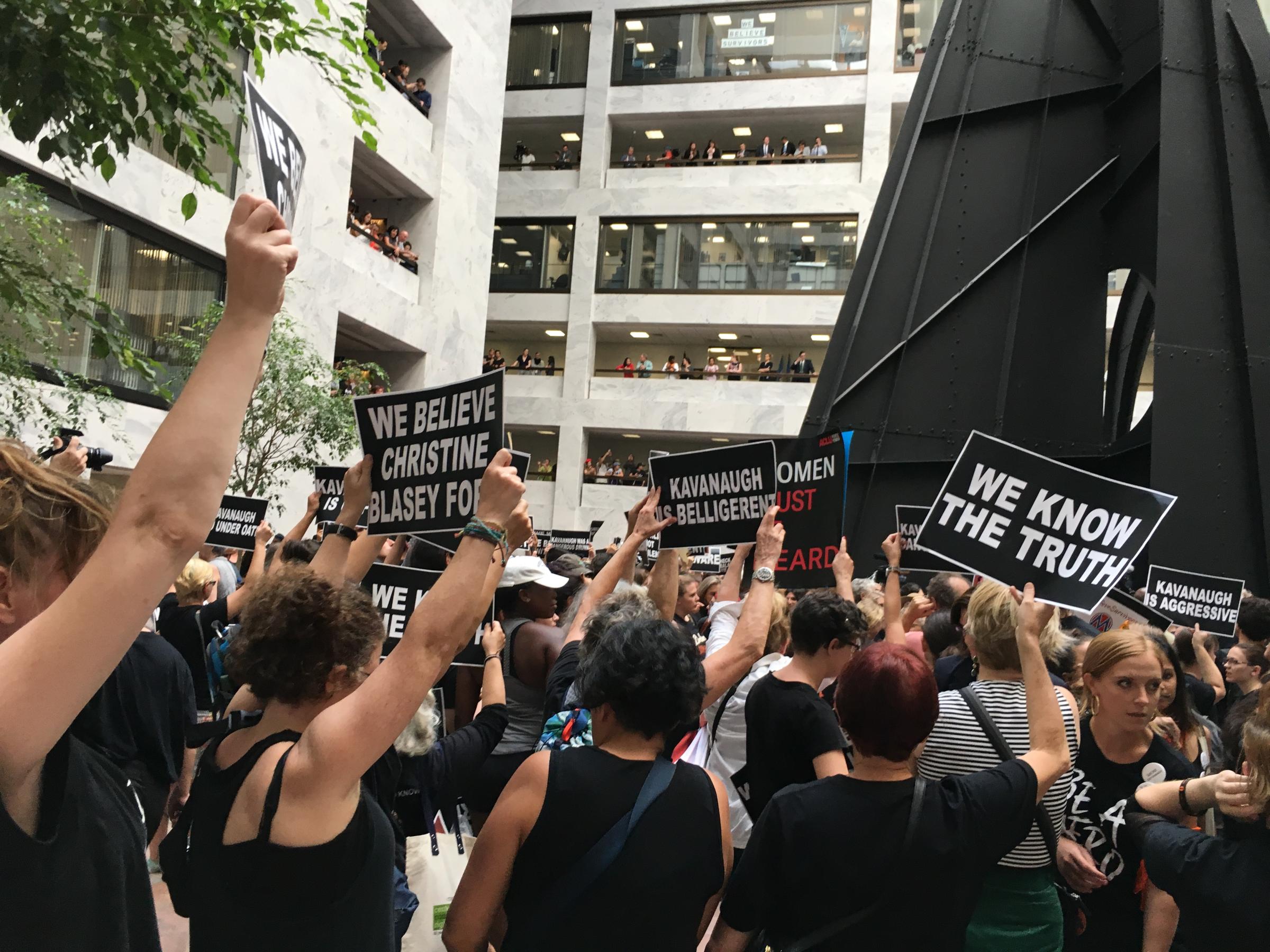As Senators huddled around the closely guarded FBI report on Judge Brett Kavanaugh’s alleged assault of Christine Blasey Ford on Thursday, the protesters seeking to sink his nomination turned up the volume.
They had been demonstrating for weeks, occupying the atrium of Washington, D.C.’s Hart Senate Office Building, flooding phone lines, and confronting wary Senators in airports. But where previous protests had included at most a few hundred hardcore activists, at least a thousand people turned out for Thursday’s demonstration. The protesters were mostly women, who came on 20 buses from around the country. (At least 100 people flew in from Alaska specifically to demand that their Senator, Lisa Murkowski, listen to sexual assault survivors, according to the ACLU.) It was the first in a series of planned actions by groups including the Women’s March, the Center for Popular Democracy Action, Planned Parenthood and UltraViolet that aim to elevate the voices of sexual assault survivors as lawmakers vote on Kavanaugh’s nomination.
At least 300 people risked arrest by sitting down in the atrium of the Hart Building and refusing to leave, including actress Emily Ratajkowski and comedian Amy Schumer. As the protesters were arrested, some started to chant, “arrest sexual predators, not protesters!” Some women painted their faces with the word “No” scrawled underneath their eyes. Others wore hand-made T-shirts alluding to their own assaults. One said “1988, I was 19, #MeToo,” another said “standing up for my 12-year-old self.” One woman, who had flown in from Los Angeles for the protest, wore a blue dress with hand-painted letters that said “Confirming a Liar is Not Patriotic.” Protesters cheered as somebody dropped a banner that said “We Believe All Survivors.”

UltraViolet, a group that organizes against sexual violence, rented a truck with a screen to play President Donald Trump’s infamous Access Hollywood tape on a loop outside the Capitol. Women lined up cheerfully outside the Senate building to await the plastic cuffs, laughing and cheering for each other and holding up their hands with “I believe her” written on their palms in Sharpie. After their release, organizers would be waiting for them with food, water, and hugs.
The mood was at times confrontational. Since the fight over Kavanaugh began, hundreds of women have attended trainings on how to “bird-dog,” or confront their representatives about issues, often in public and on camera. Emboldened by the success of the elevator confrontation with Republican Sen. Jeff Flake of Arizona that apparently changed his mind about investigating Ford’s claims, activists have bird-dogged Senators entering and exiting their offices and even at the airport. Some women roamed the halls looking for Senators to confront, but the moderate Republicans were nowhere to be found. When Democratic Senator Elizabeth Warren of Massachusetts attempted to return to her office, activists started to chant “Elizabeth for President.”
Tracey Corder, the director of the Racial Justice Campaign at the Center for Popular Democracy Action and who helped lead some of the bird-dog trainings, approached Senate Majority Leader Mitch McConnell in an airport on Oct. 1 to ask him to listen to women’s stories of sexual assault. The Majority Leader ignored the confrontation from her and her colleague, both women of color, but offered his hand to a white man as he passed. This infuriated Corder. “It’s all men making this decision to confirm somebody with serious allegations of violence against women, and these men can’t even make time to speak to women,” she said. “This is our generation’s Anita Hill moment.”
While the protesters’ focus was undoubtedly on women survivors of sexual assault, the crowd included plenty of men as well, many of them wearing T-shirts with photos of the now-famous confrontation between Center for Popular Democracy co-founder Ana Maria Archila and Sen. Flake.
“This is our way of taking over their spaces in the same way this trauma has limited our lives,” says Flor Montero, special projects coordinator with the Women’s March. “People are no longer afraid of being singled out as a victim of abuse.”
More Must-Reads From TIME
- The 100 Most Influential People of 2024
- The Revolution of Yulia Navalnaya
- 6 Compliments That Land Every Time
- What's the Deal With the Bitcoin Halving?
- If You're Dating Right Now , You're Brave: Column
- The AI That Could Heal a Divided Internet
- Fallout Is a Brilliant Model for the Future of Video Game Adaptations
- Want Weekly Recs on What to Watch, Read, and More? Sign Up for Worth Your Time
Write to Charlotte Alter at charlotte.alter@time.com